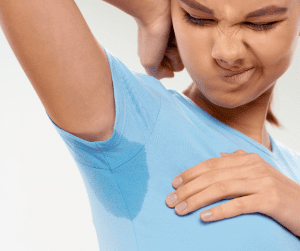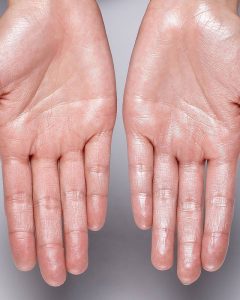Hyperhidrosis: What You Need To Know About It

Hyperhidrosis is a condition characterized by excessive sweating that can occur even when it’s not hot or during physical activity. It can be quite disruptive and lead to social anxiety and embarrassment for those affected.

One of the key symptoms of hyperhidrosis is heavy sweating that occurs beyond what’s typical in response to heat, exercise, or stress. It often affects specific areas like the hands, feet, underarms, or face and can occur on both sides of the body.

Excessive sweating can have causes that aren’t due to underlying disease. Examples include heavy exercise, being in a hot environment or spending time in a sauna.
Types Of Hyperhidrosis
1. Primary hyperhidrosis: is caused by faulty nerve signals that trigger eccrine sweat glands to become overactive. It usually affects the palms, soles, underarms and sometimes the face.
There is no medical cause for this type of hyperhidrosis. It can run in families.
2. Secondary hyperhidrosis: is caused by an underlying medical condition or by taking certain medications, such as pain relievers, antidepressants, and some diabetes and hormonal medications. This type of hyperhidrosis may cause sweating all over the body. Conditions that might cause it include:
Diabetes
Menopause hot flashes
Thyroid problems
Some types of cancer
Nervous system disorders
Infections
READ ALSO: 5 Compelling Reasons To Make Fruits Your Daily Go-To
Does Hyperhidrosis Run In Families?
Yes, you may be more at risk of hyperhidrosis, specifically focal hyperhidrosis, if someone in your biological family has the condition. Research indicates that a hereditary genetic mutation or change to your DNA could cause hyperhidrosis.
Complications Of Hyperhidrosis
Hyperhidrosis can cause complications that include:
1. Infections: People who sweat a lot are more prone to skin infections.
2. Social And Emotional Effects: Having clammy or dripping hands and sweat-soaked clothes can be embarrassing. Your condition may affect your pursuit of work and educational goals.
3. Hyperhidrosis can also impact your mental health. You may find yourself changing your routine to hide your symptoms from others. Constant sweating may be so severe that you avoid common actions, such as lifting your arms or shaking hands. You may even give up activities you enjoy to avoid problems or embarrassment from excessive sweating. Contact a healthcare provider if hyperhidrosis affects your mental health and social well-being.
What You Should Do When You Have This Condition
Diagnosis
When diagnosing hyperhidrosis, your healthcare provider may begin by discussing your medical history and symptoms. A physical examination and additional tests might be conducted to determine the underlying cause of your excessive sweating. These steps are important for an accurate diagnosis and to guide the appropriate treatment plan for your specific situation.
Lab Tests
Your healthcare provider may suggest various lab tests, such as blood and urine tests, to rule out any underlying medical conditions that could be causing the excessive sweating. Conditions like hyperthyroidism or hypoglycemia can lead to similar symptoms, and it’s essential to identify and address any such underlying issues as part of the diagnostic process for hyperhidrosis.
Sweat Test
You may need a test that pinpoints the areas of sweating and evaluates how severe your condition is. Two such tests are an iodine-starch test and a sweat test.
Treatment
Treating hyperhidrosis may start with treating the condition causing it. If a cause isn’t found, treatment focuses on controlling heavy sweating. If new self-care habits don’t improve your symptoms, your health care provider may suggest one or more of the following treatments. Even if your sweating improves after treatment, it may recur.
Medications
Drugs used to treat hyperhidrosis include:
1. Prescription Antiperspirant. This product can cause skin and eye irritation. Talk with your health care provider about ways to reduce side effects.
2. Prescription Creams And Wipes. Possible side effects of these products include mild skin irritation and dry mouth.
3. Nerve-blocking Medications. Some pills (oral medications) block the nerves that trigger sweat glands. This can reduce sweating in some people. Possible side effects include dry mouth, blurred vision and bladder problems.
4. Antidepressants. Some medications used for depression can also decrease sweating. They may also help decrease anxiety.
Surgical And Other Procedures
When other treatments don’t work well and your symptoms persist, your provider may consider surgery.









